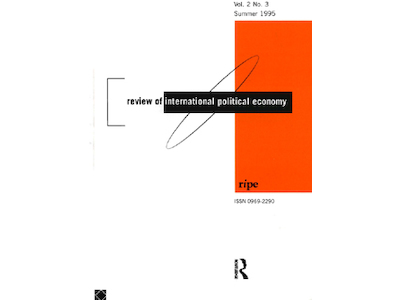Bringing Capital Accumulation Back In: The Weapondollar-Petrodollar Coalition – Military Contractors, Oil Companies and Middle-East "Energy Conflicts"
Nitzan, Jonathan and Bichler, Shimshon.
(1995).
Review of International Political Economy. Vol. 2. No. 3, Summer. pp. 446-515.
(Article - Journal; English).
![[thumbnail of 950801NB_Bringing_capital_accumulation_back_in_front.jpg]](/13/3.hassmallThumbnailVersion/950801NB_Bringing_capital_accumulation_back_in_front.jpg)  Preview |
Cover Image
950801NB_Bringing_capital_accumulation_back_in_front.jpg Download (23kB) | Preview |
Preview |
PDF (Full Text)
950801NB_Bringing_capital_accumulation_back_in.pdf Download (3MB) | Preview |
Abstract or Brief Description
This paper offers an alternative approach to the repeated occurrence of Middle East “energy conflicts.” Our analysis centres around the process of differential capital accumulation, emphasizing the quest to exceed the “normal rate of return” and to expands one's share in the overall flow of profit. With the evolution of modern capitalism, the dictates of differential accumulation become an ever stronger unifying force, drawing both state managers and corporate executives into increasingly inextricable power driven alliances.
The Middle East drama of oil and arms since the 1970s has been greatly affected by this process. On the one hand, rising nationalism and intensified industry competition during the 1950s and 1960s forced the major oil companies toward a greater cooperation with the OPEC countries. The success of this alliance was contingent on the new atmosphere of “scarcity” and oil crisis, which was in turn dependent on the progressive militarization of the Middle East. On the other side of the oil arms equation stood the large U.S. and European based military contractors which, faced with heightened global competition in civilian markets and limited defense contracts at home, increased their reliance on arms exports to oil rich countries.
Over the past quarter century, the progressive politicization of the oil business, together with the growing commercialization of arms transfers helped shape an uneasy Weapondollar Petrodollar Coalition between the principal military contractors and petroleum companies. As their environment became intertwined with the broader political realignment of OPEC and the industrial countries, the differential profits of these companies grew evermore dependent on the precarious interaction between rising oil prices and expanding arms exports emanating from successive Middle East “energy conflicts.” At the same time, these companies were not passive bystanders. This is suggested firstly by the very close correlation existing between their arms deliveries to the Middle East and the region's oil revenues and, secondly, by the fact that every single “energy conflict” since the 1967 Arab Israeli War could have been predicted solely by adverse setbacks to the differential profit performance of the large oil companies!
Language
EnglishPublication Type
Article - JournalKeywords
arms exports accumulation capital capitalism conflict corporation crisis distribution elite energy finance globalization growth imperialism GPE liberalism Middle East military national interest neoliberalism new world order oil OPEC ownership peace power profit ruling class security stagflation state stock market technology TNC United States US violence warSubject
BN TheoryBN Trade
BN State & Government
BN Region - Middle East
BN Cooperation & Collective Action
BN Industrial Organization
BN Institutions
BN Power
BN International & Global
BN Region - Asia
BN Region - North America
BN Business Enterprise
BN Value & Price
BN Region - Pacific
BN Crisis
BN Production
BN War & Peace
BN Conflict & Violence
BN Money & Finance
BN Science & Technology
BN Distribution
BN Methodology
BN Agency
BN Comparative
BN Capital & Accumulation
BN Policy
BN Class
BN Growth
Depositing User
Jonathan NitzanDate Deposited
02 Feb 2007Last Modified
29 Mar 2016 20:15URL:
https://bnarchives.net/id/eprint/13Actions (login required)
 |
View Item |
